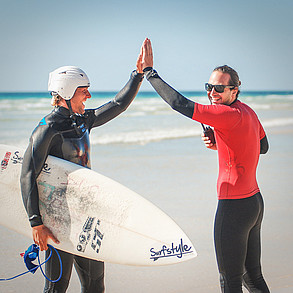Hello surfer,
Autumn is getting closer and closer and with it the days when it is no longer possible to sit in the park in shorts or t-shirts. The SUP rental stations close and the first drivers with neoprene hoods can be seen on the wacteboard system. Yes, autumn is coming, but now the really bad news comes after autumn, winter comes and it gets even colder.
This Corona summer you could already bring a bit of surf feeling home with SUP and wakeboard, but in the long term this does not of course replace surfing in the real sea.
Anyone who, like me, was badly infected with the surf virus years ago should only be planning for the next vacation at the sea for a long time, because no matter how long you go on vacation, it always passes too quickly.
Why not work where others go on vacation?
You don't have to be the best surfer to become a surf instructor
Admittedly, you should already have a little sporting talent and you should be able to paddle and ride unbroken “green” waves independently. The most important thing is that you should enjoy dealing with other people.
Sharing your enthusiasm for surfing with others and accompanying them on their way to surfing should be just as much fun as surfing itself.
Of course, very few of them become surf instructors immediately after completing a few surf camps. The first step to becoming a surf instructor is an internship in a surf school. We often have interns on our team who are preparing for the surf instructor license.
During the internship you work as a so-called “beach assistant” and support the surf instructor in explaining the techniques and supervising the surfing students on land and in the water.
Most surfing associations prescribe such an internship as preparation for a surfing instructor license. The internship should last at least 6 weeks.
The beach lifeguard certificate is the real challenge
With the completed internship you have already gained some practical experience on how to get prospective surfers into the waves and onto the waves. Empathy and patience are just as important here as basic knowledge of didactics. You will now receive this didactic and theoretical background during your training as a surf instructor.
With the completed internship you have already gained some practical experience on how to get prospective surfers into the waves and onto the waves. Empathy and patience are just as important here as basic knowledge of didactics. You will now receive this didactic and theoretical background during your training as a surf instructor.
But before the surf instructor license begins, the beach lifeguard training is due. This is the greater physical and psychological challenge.
Here you learn techniques to save people and the sea and get a more than extensive first aid course that goes far beyond the normal first aid course.
This is also important because in an emergency (which hopefully never occurs) the surf instructor is the first person on the beach and in the water and is responsible for the well-being of his surf students.
Conclusion
Becoming a surf instructor takes a while. You have to do an internship beforehand and of course you should also enjoy dealing with other people. But the great thing is that you already spend time at the sea and in the waves during your internship as a surf instructor. Later you can work where other people go on vacation.
Aloha.

